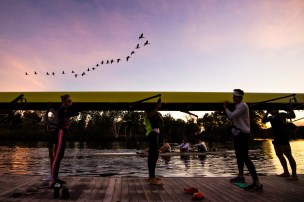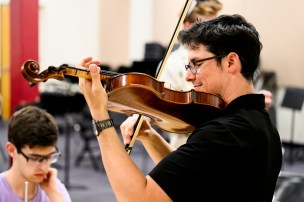Published on
Why is this Northeastern student and ROTC cadet running a marathon with a 40-pound weight on her back?
Kayla McCann, a 5-foot-4 nursing student, is running 26.2 miles in her Army boots and fatigues while carrying a heavy rucksack in a race to benefit military and first-responder families.
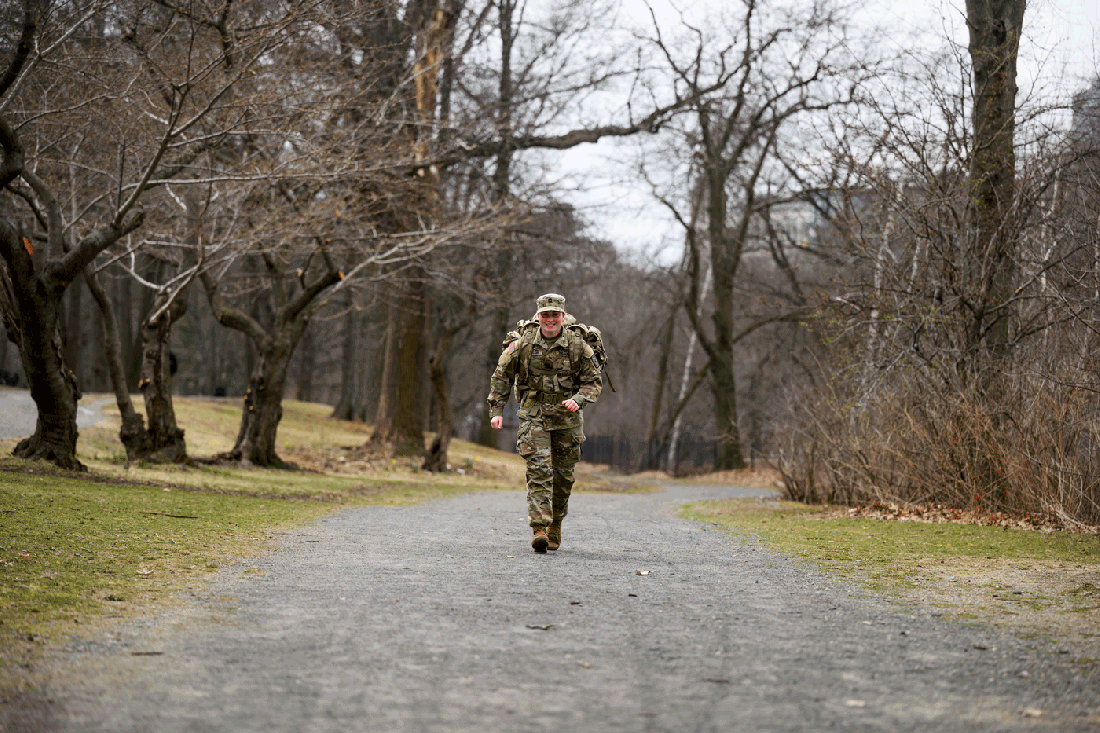
Kayla McCann is aiming to complete the Tough Ruck marathon for a second straight year. Gif by Matthew Modoono/Northeastern University
On Monday, thousands of runners will be taking on the frazzling hills of the historic Boston Marathon.
Kayla McCann is committed to an even greater challenge.
This Sunday, on the eve of the famous race, McCann is competing in another kind of marathon. McCann, a 5-foot-4-inch Army ROTC cadet at Northeastern, will be running 26.2 miles in her Army boots and fatigues while carrying a rucksack weighing 40 pounds (if not more).
“It’s a lot of pressure on your knees and your feet,” says McCann, a fourth-year nursing student. “It’s tough carrying that weight, especially in uniform.
“But it’s a really cool environment.”
The annual Tough Ruck marathon takes place on the Revolutionary War battlefields of Concord, Bedford and Lexington, Massachusetts. It commemorates and raises funds for the Military Friends Foundation, a nonprofit established after 9/11 to support the families of military and first responders who have died on duty.
The Tough Ruck marathon has been called “a living memorial to the fallen.”
Thirty-two people affiliated with Liberty Battalion, an 11-school Army ROTC consortium headed by Northeastern, are enrolled in the race. Twenty-three of them are cadets, including McCann and six others from Northeastern.
McCann made her Tough Ruck debut last year, finishing in 5 hours, 52 minutes, 20 seconds.
“I was actually very happy with that,” McCann says. “I really wasn’t sure how I was going to feel.”
McCann could have carried a “light weight” 15-pound rucksack. Instead she chose to compete in the “Female Uniformed Military/First Responder Heavy Weight Division,” requiring a ruck of 35 pounds.
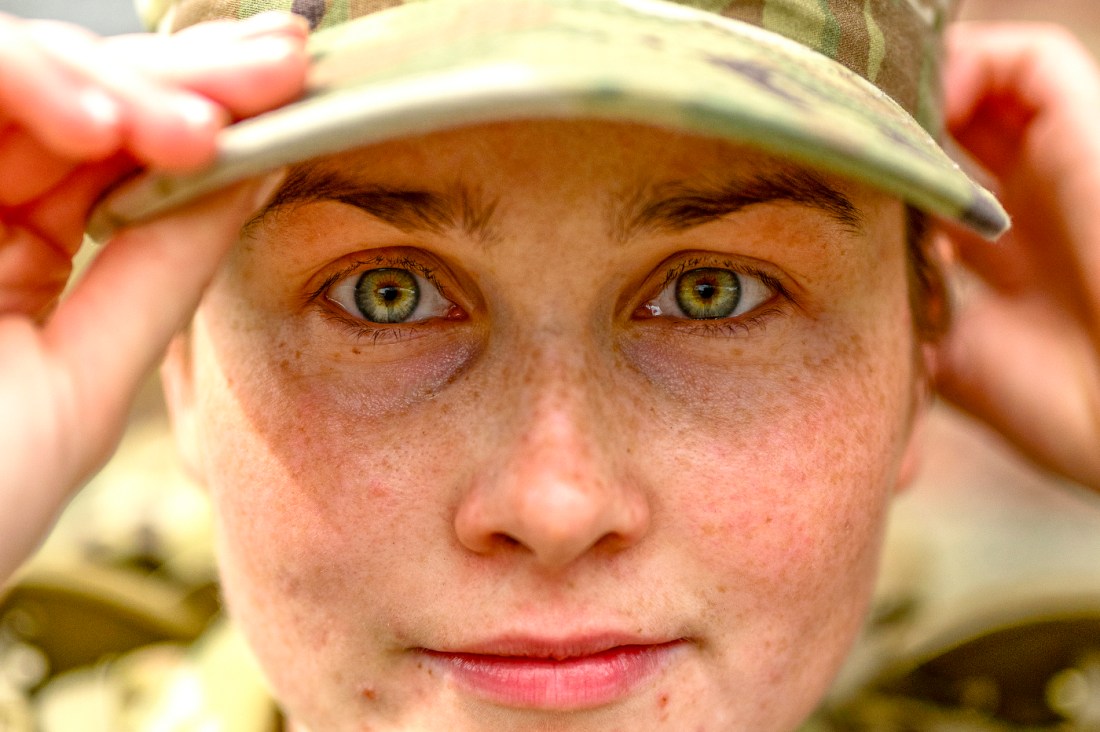
McCann filled her ruck with gear, water bottles and other provisions that weighed as much as 42 pounds. She placed third among the 20 women who finished the race in that category.
“By the time I got to just over 20 miles, I was thinking maybe I can try for sub-six hours,” McCann says. “So that was my goal from then on out.”
McCann is an Ironman triathlete who has grown used to athletic hardship. For others, including her Liberty Battalion commanding officer, the Tough Ruck experience was more difficult.
“I did it last year with the cadets,” says Col. Brian Slotnick, who finished in 6:25:11 (placing him 36th among 113 uniformed men carrying a heavyweight ruck). “And it was painful.
“I would jog for a little bit — a slow jog — and then walk,” Slotnick says. “I did that until I got to the point where my feet started to hurt. And then I was in walking mode the last couple miles.”
Why do McCann, Slotnick and others volunteer for such an excruciating exercise?
‘It’s helped me learn more about myself’
McCann was drawn to the Tough Ruck by a few influences — her career choice, first of all.
“I’ve wanted to be a nurse ever since middle school,” says McCann, who while visiting members of her family would find herself thinking about the support and care provided by medical professionals.
She became aware of ROTC while attending a college fair as a high school junior. McCann applied and earned a full Army scholarship to Northeastern.
By then she was well into an athletic career that, as she sees it, complements her nursing and military commitments. McCann began competing in sprint-distance triathlons in middle school.
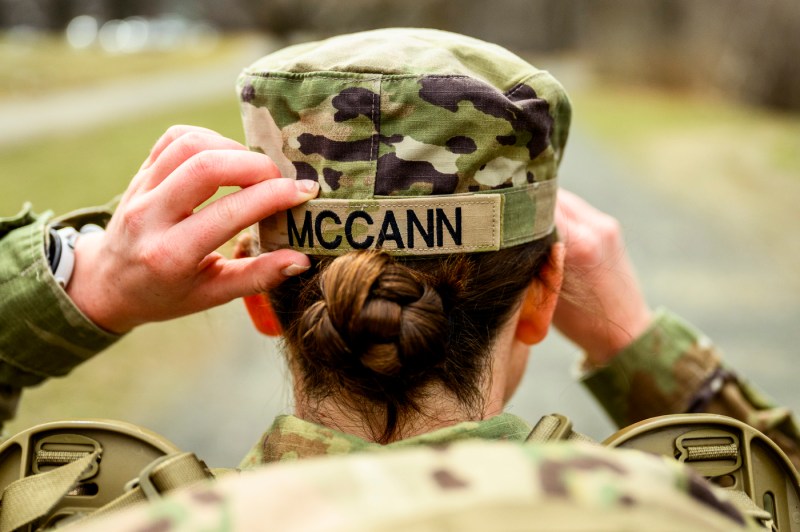
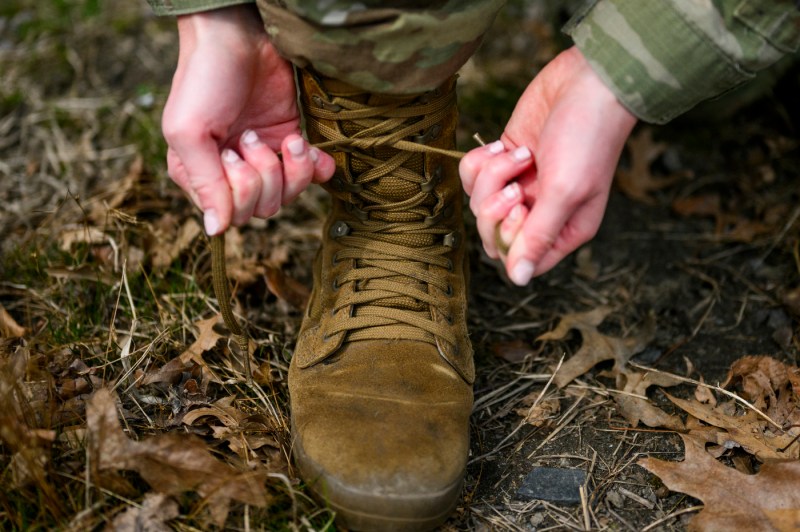
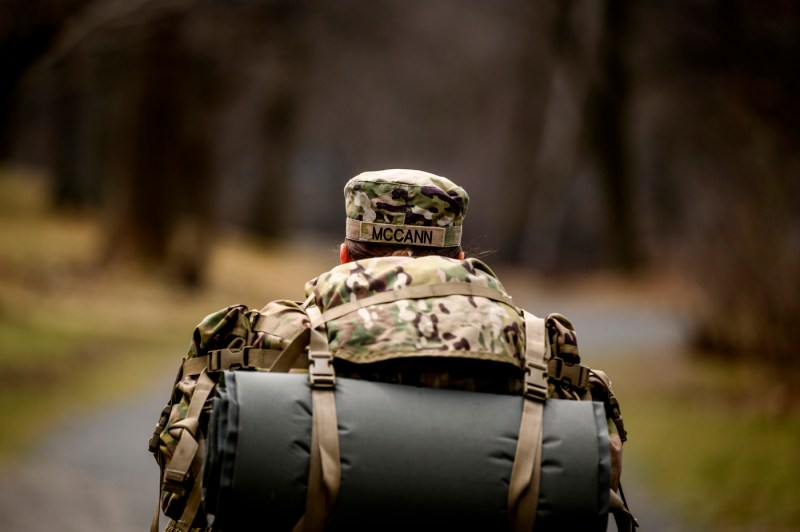
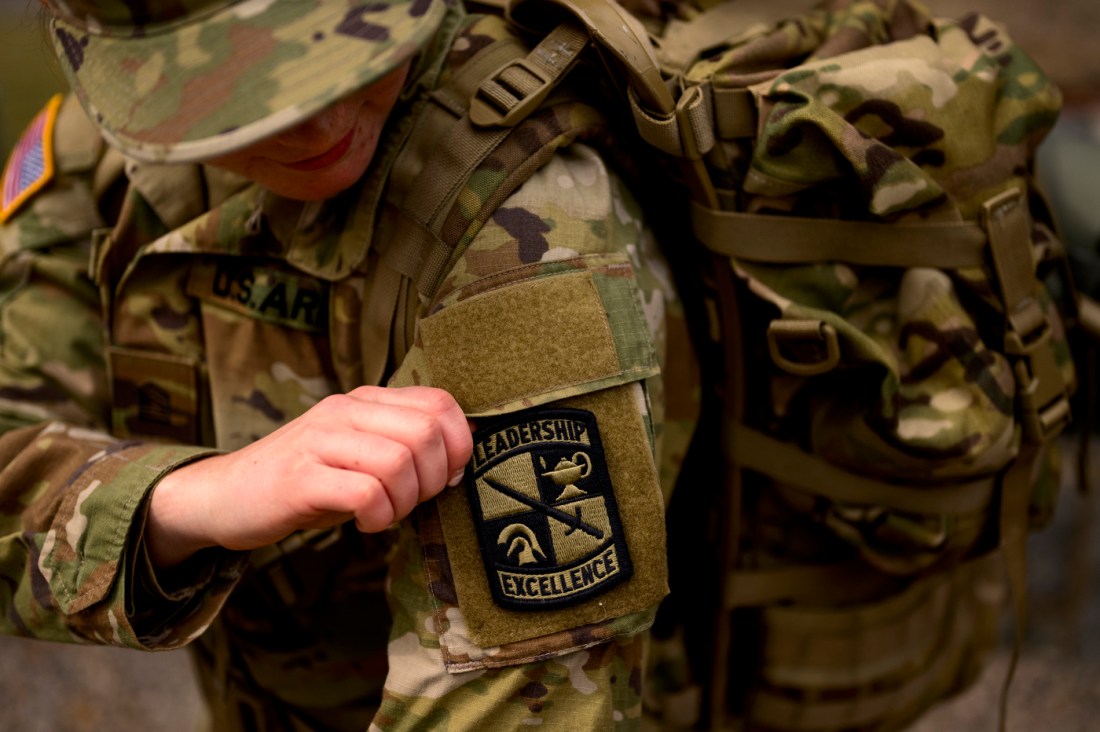
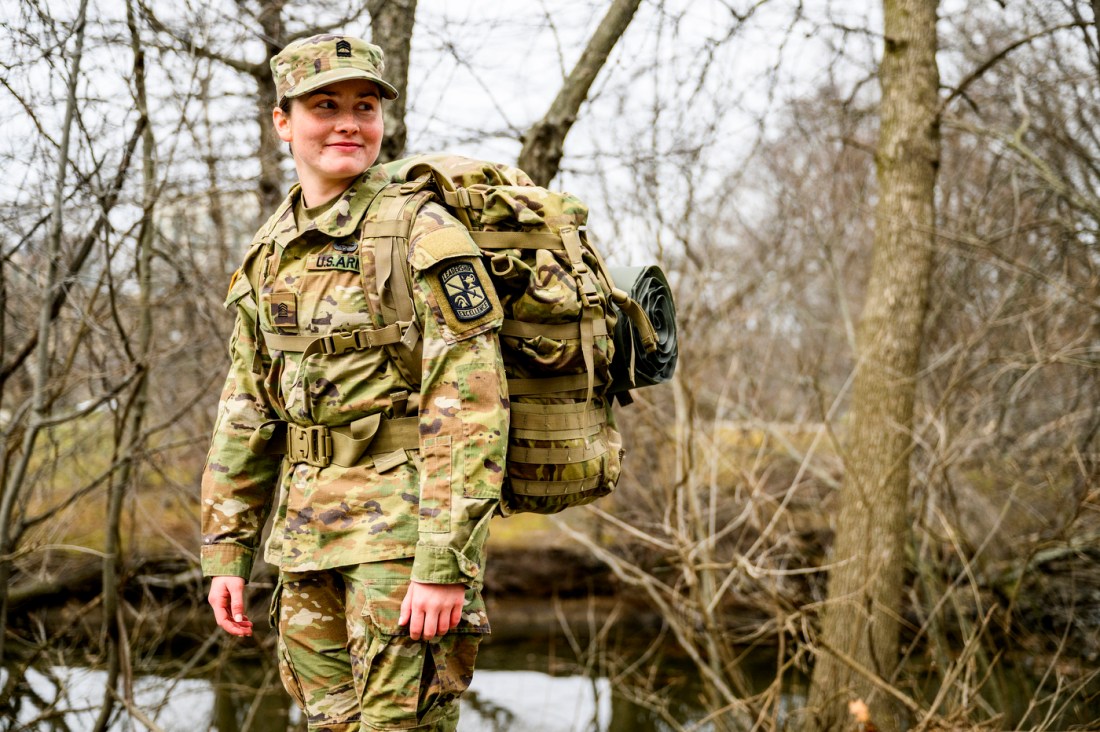
“Ever since eighth grade I’ve dreamed of doing the Ironman distance — and especially going to Kona, Hawaii, to do it. All of a sudden in college, I was like, ‘Hey, why not?’ I was doing Olympic-distance races through the Northeastern triathlon team. But I wanted to see how far I could push myself, both my mind and body, so I signed up for the longer Ironman distance races.”
McCann qualified for the Ironman World Championship last October at Kona, Hawaii. She finished the required 2.4-mile swim, 112 miles of cycling and a full marathon in a combined 11:54:44 — and came away with vivid memories that at times seem incongruous with the demands of the race.
“The swim course was gorgeous in the ocean, you were able to see some fish and turtles beneath us,” McCann says. “But of course there was a current wave that was tough to swim against.”
She finished the swim in a little over an hour before climbing on her bike.
“The bike course was really nice, though it was during the hottest part of the day,” McCann says. “It went through some lava fields on the side of a volcano, so that was fun. And it was cool to see all the professional athletes who I only ever see online.”
After all of that she was still able to run the marathon in 4:20:14.
“The marathon course was also pretty,” McCann says. “I was finishing as the sun was setting by the ocean. But it was tough with the heat and the hills. At one point there’s no crowd at all, so it’s just you in your head, and at that point it’s really, really tough to keep going.”
Imagine almost 12 hours of nonstop competition among the world’s best athletes. The average temperature that day was 80 degrees.
“By the end my muscles were cramping,” McCann says. “My electrolytes were definitely abnormal, I was lacking in everything, and my dehydration status was pretty poor from the heat. My stomach couldn’t take much more fueling because I was intaking a lot of gels and salt tablets throughout the day. My feet, my mouth, even my arms started to hurt. You’re using every ounce of your body muscle to just keep going the last couple of miles.
“But I was able to kick to the finish and make it in under my goal of time. My goal was sub-12 hours, so I was super excited about doing that.”
McCann believes the lessons of her athletic career will help her fulfill her goals throughout her life.
“I originally started Ironman triathlon racing for my mental health, and it definitely has helped me overcome so many things,” she says. “Between the training and the race itself, it’s helped me learn more about myself — how determined I am or how I can put my mind to something and be able to do it or not give up on a goal that I have or a team has.”
The Tough Ruck marathon provides similar affirmation.
“It shows me that I will be able to put my all into achieving a goal that my team has in mind,” McCann says. “It shows me what I’m willing to do for that.”
Going above and beyond
The original Tough Ruck marathoners participated in the Boston Marathon in 2013. Having already crossed the finish line when the terrorist bombs exploded nearby, they responded quickly to the attacks and helped evacuate the wounded.
The Tough Ruck marathon is officially sanctioned by the Boston Athletic Association, which oversees the Boston Marathon. Tough Ruckers will receive official BAA medallions for finishing their race.
Approximately 25% of the cadets at Liberty Battalion will be running Sunday.
“I think it says a lot about what they represent,” Slotnick says. “There is an underlying theme for our cadets that, if you want to be successful, you’re going to need to go above and beyond what we’re asking you to do. I think Kayla is a good example of that.”
Slotnick says McCann has taken on cadet leadership challenges that wouldn’t necessarily be expected of a nursing student.
McCann has done two co-ops at Mass General Hospital, including one that required night-shift duty (forcing her to train for the Ironman during the day). She envisions serving as an active-duty U.S. Army nurse for at least four years in fulfillment of her ROTC scholarship.
“I think it’s going to have a huge benefit for me,” McCann says of beginning her nursing career in the Army. “Through ROTC I’ve gained a huge amount of confidence in my leadership abilities along with my nursing tactics, so I feel like starting in the Army is going to give me an advantage.”
Ian Thomsen is a Northeastern Global News reporter. Email him at i.thomsen@northeastern.edu. Follow him on X/Twitter @IanatNU.







